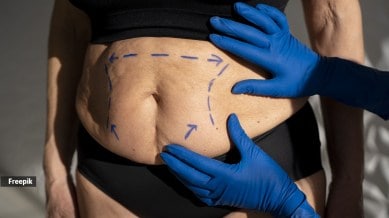📣 For more lifestyle news, click here to join our WhatsApp Channel and also follow us on Instagram
‘He couldn’t walk or remember things’: 25-year-old develops brain damage after bariatric surgery; how thiamine deficiency can strike within days
When questioned about his recent medical history, the patient revealed that he had undergone bariatric (weight loss) surgery just three weeks earlier.

A 25-year-old man recently approached Hyderabad-based neurologist Dr Sudhir Kumar with alarming symptoms — blurred and double vision, unsteady gait, forgetfulness, and confusion all developing within three days.
Sharing the case on X, Dr Kumar wrote, “I recently met a 25-year-old man who came to me with unusual complaints — blurred vision, double vision, difficulty walking, and forgetfulness that had developed over just three days. He appeared anxious and confused, and his unsteady gait was striking.”
When questioned about his recent medical history, the patient revealed that he had undergone bariatric (weight loss) surgery just three weeks earlier. Since then, he had been on a highly restricted diet, barely able to eat and struggling to take nutritional supplements. Dr Kumar noted, “Given his symptoms and recent surgery, I suspected a nutritional deficiency affecting the brain. His MRI scan revealed characteristic changes in the periaqueductal region and mammillary bodies — classical findings of a neurological condition called Wernicke’s encephalopathy.”
Explaining the diagnosis, Dr Kumar wrote, “Wernicke’s encephalopathy (WE) is a neurological emergency caused by a severe deficiency of thiamine (vitamin B₁). Thiamine is essential for brain energy metabolism, and its deficiency can quickly damage areas of the brain responsible for memory, coordination, and eye movements.” While this condition is most commonly seen in people with chronic alcoholism, it can also develop after bariatric surgery, prolonged vomiting, starvation, or certain infections.
Prompt intervention proved lifesaving in this case. “We immediately started the patient on high-dose intravenous thiamine injections, followed by oral supplementation. Within days, his vision improved, balance returned, and memory became clearer — a remarkable recovery that highlighted the importance of early diagnosis and prompt thiamine therapy,” Dr Kumar shared.
How does thiamine deficiency affect brain function so quickly, and why is it especially common after bariatric surgery or extreme dietary restriction?
Dr Jagdish Chattnalli, senior minimal invasive brain and spine surgeon, Bengaluru West Clinics, HCG Hospitals Bengaluru, tells indianexpress.com, “Thiamine, or vitamin B1, is essential for converting glucose into energy within brain cells. Since the brain depends almost entirely on glucose for fuel, a thiamine deficiency can rapidly disrupt its energy metabolism. When thiamine levels fall, neurons are unable to function efficiently, leading to swelling, oxidative stress, and ultimately, cell damage.”
After bariatric surgery or during prolonged dietary restriction, he says, the risk increases because food intake is reduced and nutrient absorption in the intestines is often compromised. In such situations, even a short period of poor intake or vomiting can quickly deplete thiamine stores. The brain, being highly energy-dependent, is among the first organs to show the effects, which is why symptoms can develop within days.
Early neurological warning signs people should watch out for after major weight loss or dietary changes
Dr Chattnalli states that early warning signs include “persistent fatigue, irritability, confusion, poor memory, blurred or double vision, imbalance while walking, or unsteadiness.” Sometimes, people may dismiss these as weakness or dehydration, but these could be early indicators of thiamine deficiency affecting the brain.
Specific vitamins and minerals that post-bariatric patients should prioritise
“The key vitamins and minerals that need regular supplementation include thiamine (vitamin B₁), vitamin B₁₂, folate, iron, calcium, and vitamin D. Thiamine supplementation is particularly important in the first six months post-surgery, when patients are most vulnerable due to restricted intake and frequent vomiting,” says Dr Chattnalli.
Nutritional follow-ups should ideally occur every three to six months during the first year and at least annually thereafter. Regular follow-up, coupled with a balanced diet and adherence to prescribed supplements, can ensure that patients enjoy the long-term benefits of weight loss without neurological risks.
DISCLAIMER: This article is based on information from the public domain and/or the experts we spoke to. Always consult your health practitioner before starting any routine.
📣 For more lifestyle news, click here to join our WhatsApp Channel and also follow us on Instagram